|
|
|
Sort Order |
|
|
|
Items / Page
|
|
|
|
|
|
|
| Srl | Item |
| 1 |
ID:
114224
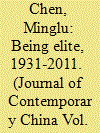

|
|
|
|
|
| Publication |
2012.
|
| Summary/Abstract |
Current interpretations of the People's Republic of China emphasize the discontinuities of 1949, and even 1978 to some extent. An examination of the experience of a Chinese family from 1931 to 2011 through three generations suggests that processes of elite formation are more complex and their interpretation might be more nuanced. In the process it highlights how one elite family managed to establish and maintain its elite status against a background of dramatic social change, and raises questions of the relationship between elite formation and the existence of a ruling class.
|
|
|
|
|
|
|
|
|
|
|
|
|
|
|
|
| 2 |
ID:
114227
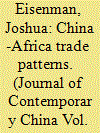

|
|
|
|
|
| Publication |
2012.
|
| Summary/Abstract |
China's trade patterns with African countries have made Beijing the focal point of new anti-Chinese resistance narratives in Africa. Unlike the Maoist era, when China's trade policies served its leaders' political goals, now they aim to access markets as part of China's larger domestic development strategy. China's state-run firms can channel China-Africa trade through extra-market decisions that influence flows, yet, ultimately, Beijing's ability to direct trade with Africa is constrained by market forces. Despite suggestions that shared illiberalism drives China-Africa trade the author concludes that five interrelated causal factors overwhelmingly determine China-Africa trade: China's comparative advantage in labor-intensive and capital-intensive production; Africa's abundant natural resource endowments; China's rapid economic growth; China's emphasis on infrastructure building at home and in Africa; and the emergence of economies of scale in China's shipping and light manufacturing sectors.
|
|
|
|
|
|
|
|
|
|
|
|
|
|
|
|
| 3 |
ID:
114233
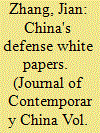

|
|
|
|
|
| Publication |
2012.
|
| Summary/Abstract |
China's defense white papers have long been dismissed as lacking substance and offering little useful information on China's real strategic intentions and military capabilities. Nevertheless, since 1998 Beijing has continued to issue defense white papers on a regular two-year frequency. Indeed, in recent years it has accorded greater importance to these documents. This paper argues that China's defense white papers warrant more attention than they have received so far. An examination of the making of the white papers, the functions designated for these documents and their evolving content and structure reveals not only the different nature and purpose of the Chinese white papers compared with their counterparts in Western countries, but also important changes and continuities in China's strategic outlook and its evolving perceptions of the role of the use of force in the context of the country's re-emergence as a major player in international affairs.
|
|
|
|
|
|
|
|
|
|
|
|
|
|
|
|
| 4 |
ID:
114228
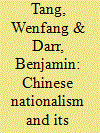

|
|
|
|
|
| Publication |
2012.
|
| Summary/Abstract |
Using the 2008 China Survey, this paper examines Chinese respondents' feelings toward their country and how such feelings are related to their democratic values. First, it compares Chinese nationalism with that of 35 countries and regions in the 2003 National Identity Survey. Second, it looks at the origins of Chinese nationalism as embedded in the social and political characteristics of individuals. Third, it further examines the impact of nationalism on people's political attitudes. The findings show that nationalism in contemporary China is better predicted by the political and economic characteristics of an individual rather than cultural attributes, and that nationalism serves as a powerful instrument in impeding public demand for democratic change.
|
|
|
|
|
|
|
|
|
|
|
|
|
|
|
|
| 5 |
ID:
114226
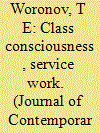

|
|
|
|
|
| Publication |
2012.
|
| Summary/Abstract |
This essay discusses an interesting paradox forming in urban China today. Using a Weberian framework, it argues that recent changes in state policy, educational structures, and forms of social status are producing new social classes. Yet at the same time, the very processes and policies that enable these new class formations also mitigate against the development of class consciousness. Based on a year of ethnographic research in two vocational secondary schools in Nanjing, this essay looks closely at the ways in which young people who are preparing to enter the lower echelons of the urban service economy are potentially part of a new social class, but one with very limited potential to develop class consciousness.
|
|
|
|
|
|
|
|
|
|
|
|
|
|
|
|
| 6 |
ID:
114223
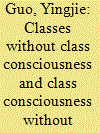

|
|
|
|
|
| Publication |
2012.
|
| Summary/Abstract |
The meaning of class, like many other things, is conferred by historically specific chains of signification or discourses that constitute the identity and significance of class as a social reality. Therefore, much of the conceptual purchase and explanatory power of class will be lost when the concept is taken out of the theories in which it is embedded. This is exactly the case with the use of class in the People's Republic of China in the last two or three decades, when the Marxist approach to class has been rejected and 'forgotten' by the social analysts and the Chinese Communist Party-even though the latter continues to pay lip service to Marxism-in favour of alternative concepts, methodologies and theories that sidestep class relations. The point of departure here is not so much sociological as political-ideological.
|
|
|
|
|
|
|
|
|
|
|
|
|
|
|
|
| 7 |
ID:
114231
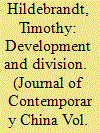

|
|
|
|
|
| Publication |
2012.
|
| Summary/Abstract |
Identity movements, such as those representing LGBT communities, are assumed to be highly universalized; they are often thought to be highly dependent upon international linkages in order to emerge and develop. Although the Chinese LGBT movement owes much of its development to global civil society and international donors, this article presents survey and interview data that show its linkages with the international community are not as strong as we might expect. The article shows that economics and politics of transnational activism in China are tightly intertwined. The means by which LGBT activism has developed in China has simultaneously contributed to division within its ranks and with global civil society: the nature of international funding-while from foreign sources it is funneled through the Chinese government-and local political conditions ultimately impedes the growth of stronger transnational linkages.
|
|
|
|
|
|
|
|
|
|
|
|
|
|
|
|
| 8 |
ID:
114232


|
|
|
|
|
| Publication |
2012.
|
| Summary/Abstract |
Over the last two decades, international actors have sought to diffuse repertoires of contentious practices, including rights-based litigation, to China. Multilateral organizations, foundations, and international non-governmental organizations (INGOs) have used funding and training programs conducted in China and at law schools abroad in order to raise the capacity of Chinese attorneys, NGOs, judges, and legal officials to improve rule of law and protection of human rights. In particular, international actors have worked with Chinese NGOs and state officials to found legal aid centers that provide information and advocacy to protect the rights of pollution victims and AIDS carriers. Legal aid centers, attorneys, and their financial backers seek to bring forward 'impact litigation' cases in the courts to establish model decisions for other plaintiffs, attorneys, and judges to follow. To date, environmental groups have enjoyed more success gaining access to the courts and in receiving favorable court judgments than have AIDS groups. In many cases involving AIDS victims, attorneys and legal aid centers seek compensation through alternative dispute resolution methods rather than litigation, which do not establish a legal precedent. This paper explores the reasons for the divergent outcomes of efforts to protect the rights of pollution victims and AIDS carriers in the courts. Primarily, the institutional particularities and contexts of the Ministry of Environmental Protection and the Ministry of Public Health have allowed international legal norms related to the environment to take deeper root than those related to AIDS.
|
|
|
|
|
|
|
|
|
|
|
|
|
|
|
|
| 9 |
ID:
114229
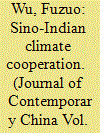

|
|
|
|
|
| Publication |
2012.
|
| Summary/Abstract |
The international climate change regime is comprised of the United Nations Framework Convention on Climate Change and its Kyoto Protocol. Under the regime, China and India, two of the largest developing countries, have been exempted from any binding greenhouse gas (GHG) emissions reduction targets that apply to developed countries. However, with their GHG emissions increasing, China and India have faced growing international pressure to undertake binding mitigation obligations in international climate change negotiations. To enhance their bargaining power in the negotiations, China and India have been cooperating with each other, which has not only led to a new approach to addressing climate change but also defended the ethical benchmark of the regime. In addition, their cooperation has weakened the EU's traditional leadership status and the leadership ambitions of the US such that China and India will now play a more important role in shaping the future of the regime.
|
|
|
|
|
|
|
|
|
|
|
|
|
|
|
|
| 10 |
ID:
114225


|
|
|
|
|
| Publication |
2012.
|
| Summary/Abstract |
This paper examines how debates in the media are providing the discursive conditions for, and thereby giving impetus to, diverse strategies of 'so-called primitive accumulation' in China. Taking as its empirical referent Chinese news and journal articles on land enclosure, the paper analyzes three frames in which policy entrepreneurs craft varying class positions for land-losing villagers. Grounded in different ontological premises, problem diagnoses and recommendations centering on the adoption of either a statist, neo-collective or liberal rural land regime, and backed up by evaluations of local policy experiments, the frames illustrate the diversity of ideational, political and institutional configurations that could facilitate the separation of peasant producers from the land, place land-losing villagers in different relationships with the state and capital, and sustain accumulation. In foregrounding these debates over land-losing villagers' future class positioning, the paper aims to offer a corrective to the historical determinism implicit in contemporary analyses that characterize enclosure in China as simply one national manifestation of homogenous, global neo-liberal projects of 'accumulation by dispossession' or 'gangster capitalism'.
|
|
|
|
|
|
|
|
|
|
|
|
|
|
|
|
|
|
|
|
|